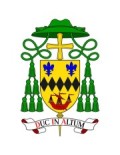Our Archdiocese
- Archbishop
- Bishop
- Vicar General & Episcopal Vicars
- Statistical Overview
- Boundaries of Archdiocese
- Organisational Structure
- Archdiocesan Assembly 2023-24
- Archdiocesan Plan 2016 - 2021
- History
- Coat of Arms
- Fifth Plenary Council of Australia
- Cathedral
- COVID-19 Position Statement
- Modern Slavery Statement
- Connect With Us
12th Sunday in Ordinary Time

12th Sunday in Ordinary Time
Homily
By the Most Rev Bishop Don Sproxton
Auxiliary Bishop of Perth
St Mary’s Cathedral Parish House
Sunday 12 June, 2020
Download the full text in PDF
The stories of people of faith drawn from their experiences of living in the way of Christ are inspiring because they so often echo the experiences that we have had ourselves. This week, I read an account by a young man who had come to a point of decision in his life: whether to go with atheism or to continue as a Christian.
He recounted that he had been brought up in a Catholic family and had been given the chance to be educated in Catholic schools and College. He attended Mass with his family and was involved in a number of Catholic groups.
When he completed his secondary education, he was able to go to university and graduated with distinction in his bachelor and master’s degrees. It was in this period that he began to wonder at the meaning of religious faith and its relevance for his life as he saw it in the future. He took this questioning very seriously and he spent a lot of time with its struggle.
Should I let go of the notion of God? Can I really be certain of the existence of God? Who was Jesus beyond being a great and wise teacher and compassionate human? The struggle went on.
I imagine that this resonates with most of us. There comes a moment in our lives when this question confronts us. And it is never easy and it is confronting. Some experience or event in our lives prompts these uncomfortable questions. The questions were faced by prophets like Jeremiah, Apostles, saints as well as most, if not all of us. They are the questions that come to the person for whom God is more than a notion or a definition, and for whom the heart must be emptied of self in order to be aligned with the will of God.
This young man eventually came to his decision by realising one thing. Above everything that he knew about God, there is the love of God that is unwavering and consistent, which he began to recognise, as he reviewed his life, in many things that had happened in his life and the lives of people around him. This love was experienced as God reaching out and being the source of strength in the short term and in the longer and protracted struggles.
Jeremiah used a very strong word to explain how he came to remain faithful to God, despite feeling that God was responsible for the misfortunes that befell him. He shouts out: You have seduced me, O God, and I have let myself be seduced.
What led Jeremiah to this decision? After all, he was in prison for being the prophet who protested against the conduct of the leadership of his people. He had been preaching against the authorities for twenty three years, and as a consequence was hated and shunned.
Despite all of this, as he looked back over those years, he believed that God had been the only source of grace, power and strength; that the reason Jeremiah was able to continue was because of the power of God that had been with him. In other words, God was faithful to him because of God’s love for him.
Jeremiah was seduced by the love of God. He realised God had the power to take from him, but acted very differently. God does not take but appeals to our better nature by loving us and providing what we truly need in the times of trial.
Jesus prepared the disciples for their mission in the world. They were to prolong the presence of Christ in the world through a community of disciples. He forewarned them that there would be opposition. As we look over the history of the Church, we see persecution, fallibility in members of the Church and great mistakes that have held the Church back.
The kingdom of God cannot be built without a stripping of the human heart and the challenge from a world which desperately needs to find in itself the means of salvation.
The mission of promoting the building of the Kingdom of God in the world is the mission of the Church. It is the mission of all the People of God. Whenever we celebrate in the Eucharist Christ’s victory over hate, we have to realise how far our sins and that of others stands in the way of the Kingdom.
Our prayer, among others in the Mass, has to be that we are delivered from the obstacles of our making. We can count on God who loves us and wants to lift us up out of our sin, to lift us to our feet and to recommence our walking together as one Body of Christ.
The young man I started speaking about today, was writing his story for a Catholic magazine. He was willing to share his story of conversion of heart in the hope that it might be an encouragement to others. He opted to continue to follow Christ, even in those mysterious times when things become unclear. But he is more and more convinced of God and the divine love that accompanies him.
He was ordained a deacon last month.
